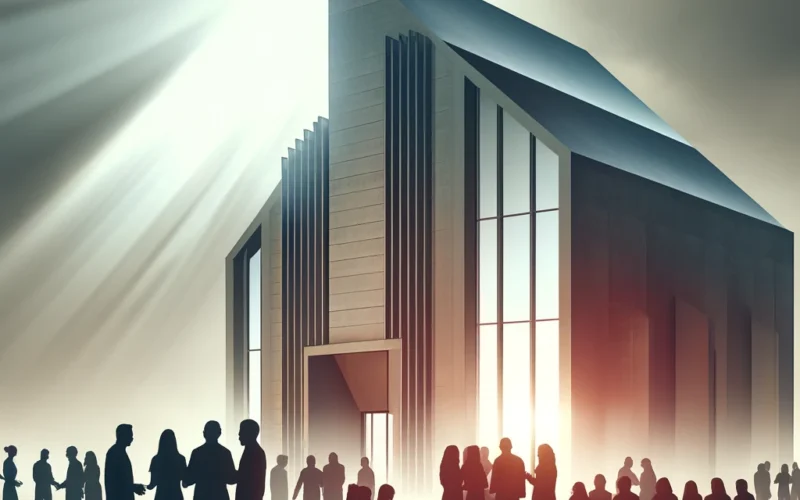The Church of the Highlands Exposed controversy has sparked discussions about transparency, leadership, and the responsibilities of faith-based organizations. With a growing spotlight on the church’s retreat center, The Lodge, this article will explore the details behind the allegations, Pastor Chris Hodges’ response, and the implications for the church moving forward.
Background and Mission of the Church
Founded in 2001 by Pastor Chris Hodges, the Church of the Highlands quickly grew to become one of the largest evangelical churches in the United States. With a mission centered on leading people to a deeper relationship with God, the church has expanded across multiple campuses, reaching thousands of people weekly. While its rapid growth is commendable, the church has also faced scrutiny, particularly regarding its handling of pastoral burnout and moral failures within its leadership.
The church’s new initiative, The Lodge, was developed as a space to help pastors recover from burnout. However, its true purpose has been questioned, leading many to ask: Is The Lodge providing refuge to pastors accused of misconduct?
Purpose of The Lodge and Its Controversy
The Lodge was designed as a retreat center for pastors in crisis, offering them rest, spiritual renewal, and a supportive environment. Pastor Chris Hodges has publicly stated that the center aims to help pastors recover from the emotional and mental toll of leading churches, especially during challenging times like the pandemic.
Despite these intentions, the Church of the Highlands Exposed allegations have centered on whether The Lodge might also be used as a safe haven for clergy accused of sexual misconduct. While Pastor Hodges has denied these claims, the controversy continues to swirl. Critics argue that the lack of transparency about the operations at The Lodge raises concerns about its true purpose.
Pastor Chris Hodges’ Role and Statements
Pastor Chris Hodges has been at the center of these allegations. As the church’s founder and leader, Hodges has been vocal about his commitment to helping pastors experiencing burnout. He has emphasized that The Lodge is a sanctuary for those facing exhaustion and stress, not a place to shield clergy accused of misconduct.
In several interviews, Hodges clarified that The Lodge’s mission is focused solely on providing support to pastors in crisis. “We are addressing burnout and helping pastors heal,” Hodges stated, addressing the media speculation about The Lodge’s role. He also highlighted his previous work with pastors who had experienced moral failings, noting that this work was unrelated to The Lodge.
Addressing Allegations and Media Reports
Publications like AL.com have reported on the controversy, with some media outlets raising concerns about The Lodge’s intended use. Former church staff members and outside observers have speculated about whether The Lodge could serve as a refuge for clergy facing serious allegations.
In response, the Church of the Highlands Exposed narrative has emphasized that the church is committed to transparency. Pastor Hodges has reiterated that any reference to a “pastoral restoration center” is about pastors recovering from burnout—not about shielding those involved in misconduct. Hodges’ firm denial of these allegations has been key to the church’s defense, yet some critics believe more transparency is needed to address the concerns fully.
Transparency and Accountability: What’s Next?
One of the main criticisms surrounding the Church of the Highlands Exposed controversy is the perceived lack of transparency. While Pastor Hodges has made efforts to clarify The Lodge’s purpose, the church could benefit from a more open and transparent approach. By providing regular updates on The Lodge’s operations and clearly outlining its policies, the church could alleviate concerns and build trust with its congregation and the wider public.
Accountability is another crucial issue. Churches, like any organization, must be held accountable for their actions. If The Church of the Highlands truly aims to support pastors dealing with burnout, it must ensure that the process is clear, transparent, and not subject to misinterpretation.
Public Reaction and Evangelical Community Impact
The controversy surrounding the Church of the Highlands Exposed has had a ripple effect across the evangelical community. Many evangelical churches face similar challenges when dealing with burnout among their leadership, but the scrutiny facing The Lodge has raised the stakes for how churches manage these issues.
Supporters of the church argue that initiatives like The Lodge are vital for helping pastors recover from the pressures of ministry. In a time where pastoral burnout is on the rise, offering a retreat center can be a valuable resource. However, critics feel that without transparency, these efforts may be seen as cover-ups, potentially damaging the trust between the church and its followers.
The wider evangelical community is watching closely, as the outcome of this controversy could influence how other churches approach similar initiatives. If the Church of the Highlands Exposed can navigate these challenges with integrity, it may set a new standard for transparency in church leadership.
Historical Controversies and Past Incidents
The current controversy is not the first time the Church of the Highlands Exposed has faced challenges. Over the years, there have been incidents involving moral failures among leadership, with Pastor Hodges playing a role in the restoration of pastors who had fallen from grace. In particular, the case of Micahn Carter, a former staff member accused of sexual misconduct, has been a point of contention.
Hodges has acknowledged that the timing of The Lodge’s development and Carter’s case may have caused confusion. However, he has been clear that The Lodge is not intended to provide refuge for clergy involved in such scandals. The church has since severed ties with Carter, underscoring its stance on moral accountability.
Lessons for Other Churches
The lessons from the Church of the Highlands Exposed can serve as a valuable guide for other churches. Navigating controversy requires clear communication, transparency, and accountability. Churches must ensure that their efforts to support pastors are not misunderstood or misrepresented, especially when public trust is at stake.
For churches considering similar initiatives, setting clear guidelines and maintaining open communication with the congregation and the public is essential. Transparency in how resources are used and who benefits from them is critical to maintaining credibility and trust.
Conclusion: Moving Forward with Clarity
The Church of the Highlands Exposed situation highlights the importance of transparency, communication, and accountability in faith-based organizations. While The Lodge is intended to serve as a sanctuary for pastors dealing with burnout, the allegations and media scrutiny have revealed the need for clearer communication about its purpose.
As the Church of the Highlands moves forward, it must continue addressing these concerns with transparency. By providing more information about The Lodge’s operations and ensuring accountability, the church can work toward restoring trust and fulfilling its mission of supporting pastors in need.
In conclusion, understanding the full scope of The Lodge’s purpose and the Church of the Highlands’ response to the allegations is essential for forming an informed opinion. The future of the church and its leadership will depend on how well they navigate these challenges, and whether they can uphold their commitment to serving both their congregation and their pastors with integrity.

